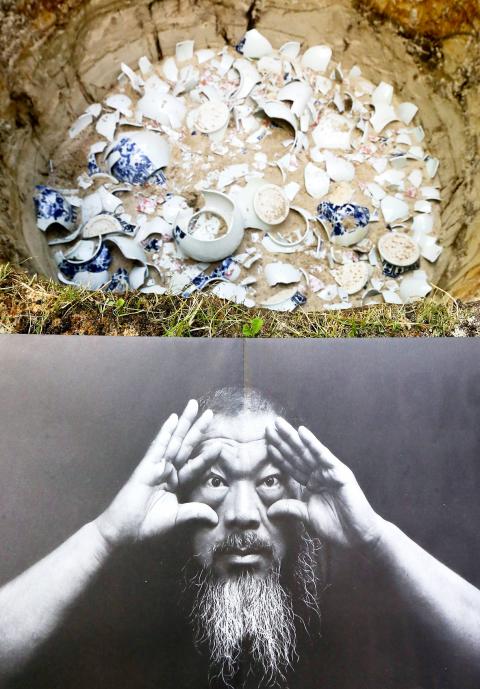Ai Weiwei says Communist Party lost its principles, blasts silent fellow artists
AP
The project
To Be Found by Ai Weiwei is unveiled in Brodnowski Sculpture Park in
Warsaw, Poland, on July 13. The installation consisted of three
cylindrical ground floors filled with broken replicas of Chinese ancient
tureens.
China’s best-known artist Ai Weiwei 艾未未 accused the Chinese Communist Party (CCP) of losing its principles and using underhand ploys to try and silence critics.
China’s best-known artist Ai Weiwei 艾未未 accused the Chinese Communist Party (CCP) of losing its principles and using underhand ploys to try and silence critics.
The artist, who supporters say was hit with a US$2.4 million tax bill in retribution for his outspoken activism, also criticized fellow Chinese artists for failing to speak up when he was singled out.
However, Ai said he was optimistic about the younger generation in an exclusive interview with The Associated Press this week at his Beijing studio, where he talked about the English-language version of a Danish documentary released this week about his tax case.
“Before, I was naive enough to think that a political regime, a strong society, would never use unsavory means in legal cases. If you bring a charge against someone, you do it in the normal way. You should not defame and frame someone and silence their voice,” Ai said.
The outspoken artist has been virtually silenced in China over the past couple of years, though he occasionally speaks to foreign journalists, and Ai said he was warned by police not to conduct this interview or he would face unspecified consequences.
“From what we see today, [the government] has completely lost its basic principles,” he said, referring to the frequent declarations of Chinese leaders that CCP members are honest and above-board people.
The 86-minute film, Ai Weiwei: The Fake Case, directed by Andreas Johnsen, opens with 2011 footage of Ai emerging from 81 days of detention amid a throng of journalists.
Already a long-time government critic, he had been detained with other
activists and dissidents amid calls for social and political reforms in
China following the Arab Spring uprisings, but then was let go without
charge.
After his release, authorities slapped his company with a US$2.4 million bill in back taxes and fines in a closed-door hearing.
After his release, authorities slapped his company with a US$2.4 million bill in back taxes and fines in a closed-door hearing.
Ai unsuccessfully fought the tax assessment in court.
In recent years, Chinese authorities have increasingly targeted activists and dissidents, as well as their relatives, on non-political charges such as disturbing public order or business-related misdeeds, instead of free speech and political dissent charges that would draw international condemnation.
In recent years, Chinese authorities have increasingly targeted activists and dissidents, as well as their relatives, on non-political charges such as disturbing public order or business-related misdeeds, instead of free speech and political dissent charges that would draw international condemnation.
Last year, a Beijing court convicted the brother-in-law of the Nobel Peace laureate Liu Xiaobo 劉曉波 of fraud charges and sentenced him to 11 years in jail.
The iconoclastic Ai has been outspoken in art and commentary since his youth.
In one of his works, Ai was photographed giving the finger to Tiananmen, the symbolic heart of China’s political establishment.
Ai wrote scathing commentary via social media from 2005 to 2009, the year his microblogs in China were shut down.
He especially angered authorities with his high-profile campaign to
highlight the shoddily built classrooms that crumbled in a 2008
earthquake and killed thousands of students.
The 57-year-old said he did not seek to be an activist.
“All my feelings and viewpoints are genuine. They are all opinions that I, as an individual or as someone linked to artwork, would normally have,” he said.
“But because of repeated crackdowns and bans, I have been turned into someone unusual, and I have become a kind of activist.”
The government has blacklisted him from any mention in state media, and the artist is not allowed to post anything on China’s social media.
Authorities have confiscated his passport so that he cannot go abroad where he might speak freely.


No comments:
Post a Comment